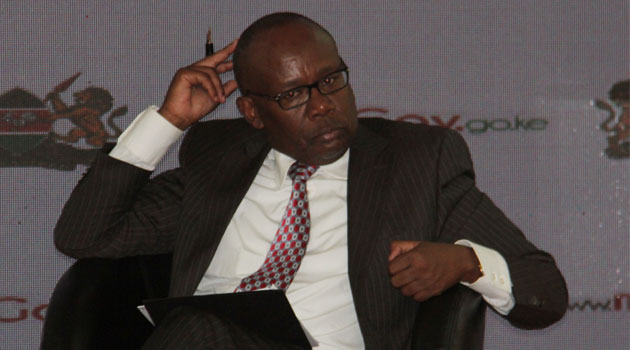
Attorney General Githu Muigai said cases in court take a long time to hear and the backlog drags the war on corruption/FILE
NAIROBI, Kenya, Oct 18 – It was definitely a summit that left heads rolling when the hot subject and in fact the commonplace vice of corruption became an open discussion at State House in Nairobi on Tuesday morning.
It was a debate that kicked off with controversy and finger pointing among the government’s law enforcement agencies with Attorney General Githu Muigai, the Director of Public Prosecutions Keriako Tobiko, Director of Criminal Investigation Ndegwa Muhoro and Ethics and Anti Corruption Commission Chief Executive Officer Halakhe Waqo taking the centre stage to redeem their offices, blamed for derailing the war against corruption.
They put the Judiciary on the spot and accused it of derailing the justice cog with undue court delays.
“The problem is the inordinate delays in concluding of these cases. A case that takes seven to eight years in court takes about the same time to investigate… in the processes witnesses disappear, documents disappear and witnesses get compromised,” Tobiko argued to the agreement of Muhoro, Waqo and Muigai.
According to the DPP, some 406 corruption cases involving 873 people are pending in court. Out of these, 98 of the cases involve high profile individuals and 22 companies.
They included five Cabinet Secretaries, six Principal Secretaries, four Governors, two Senators, nine members of the National Assembly, 16 senior country officials and 17 Chief Executive Officers of parastatals.
The four top officials regretted that judicial reviews, court injunctions including bails directly interfered with the strength of their cases especially where witnesses had given up.
“Between 2009 and 2016 – a total of 198 cases were concluded. That is in a period of roughly eight years. Therefore, a corruption case takes about three-five years to conclude. The nature of corruption case is complex and is not entirely in the hands of prosecution,” Tobiko said.
They shared their frustrations of dealing with complex corruption cases involving high level individuals who used their might to get court injunctions to delay or permanently stop their investigation and prosecution.
“Nearly every high profile case we have taken to court there are judicial stay orders granted to suspects,” Tobiko vented.
It was an argument also echoed by Muigai; “the more the bigger the amount of money involved, the more prominent and senior the lawyers involved and the more the delay.”
Court of Appeal President Justice Kihara Kariuki, who responded from the audience, partially admitted that there were unnecessary delays in the judiciary due to backlog of cases.
Though one of his excuses was longhand writing of proceedings, this argument was dismissed by Muigai who said the Judiciary had a budget to cater for computerised recording of court judgments hence judges should not be handwriting their judgments.









































